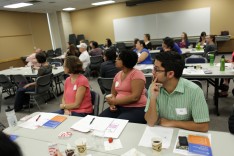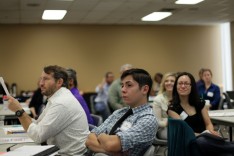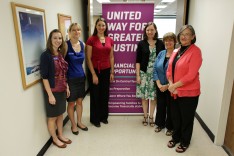“About 1 in 5 people, or 20.3 percent of all people in Austin lived in poverty [in 2011],” according to a recent Austin American-Statesman article. Although that’s a decrease from the 20.8 percent in 2010, it’s still a significant number…nearly 32,000 people.
One of the most effective solutions in fighting poverty is to educate working poor individuals and families – by supplying them with tools and support individuals can become empowered to take control of their finances.
The hurdle: Providing education to 32,000 Austinites would take a large amount of resources and even more time.
The solution: Using pre-existing platforms, such as a client/social worker relationship, to reach groups of the working poor provides considerable opportunities to scale.
Across the country, social service providers are providing financial stability services in a way that’s culturally competent and builds off a client’s strengths. By understanding the financial values and habits of clients, practitioners are better able to address the root cause of financial insecurity. And so, last week United Way for Greater Austin launched a training, the Client-focused Financial Empowerment Seminar, which was piloted at the University of Texas’ School of Social Work.
The seminar, which was a full-day training, was coordinated by UWATX’s Financial Opportunity staff and was conducted by national experts, Robin McKinney and Sara Johnson. Both McKinney and Johnson are directors of Maryland and Baltimore’s Creating Assets, Savings and Hope (C.A.S.H.) campaign, a network of organizations that promote financial stability for working families.
The more than 60 participants were able to:
- Increase their understanding of their own personal financial values and habits;
- Understand how identifying a client’s values and habits can shape a conversation around financial decisions;
- Build practical skills to work with clients on financial issues;
- Assess client financial stability needs; and
- Understand how and when to connect clients to existing resources at the local and national level.
By providing these attendees with credible training, they can spread that knowledge to their neighbors, coworkers, friends  and clients. It is our goal that they go back into our community and increase the number of working poor individuals and families that can be coached to a point of financial stability.
and clients. It is our goal that they go back into our community and increase the number of working poor individuals and families that can be coached to a point of financial stability.
Due to the success of the initial seminar, we will continue to offer trainings as well as provide classes on topics such as creating budgets and reading credit reports with clients.
